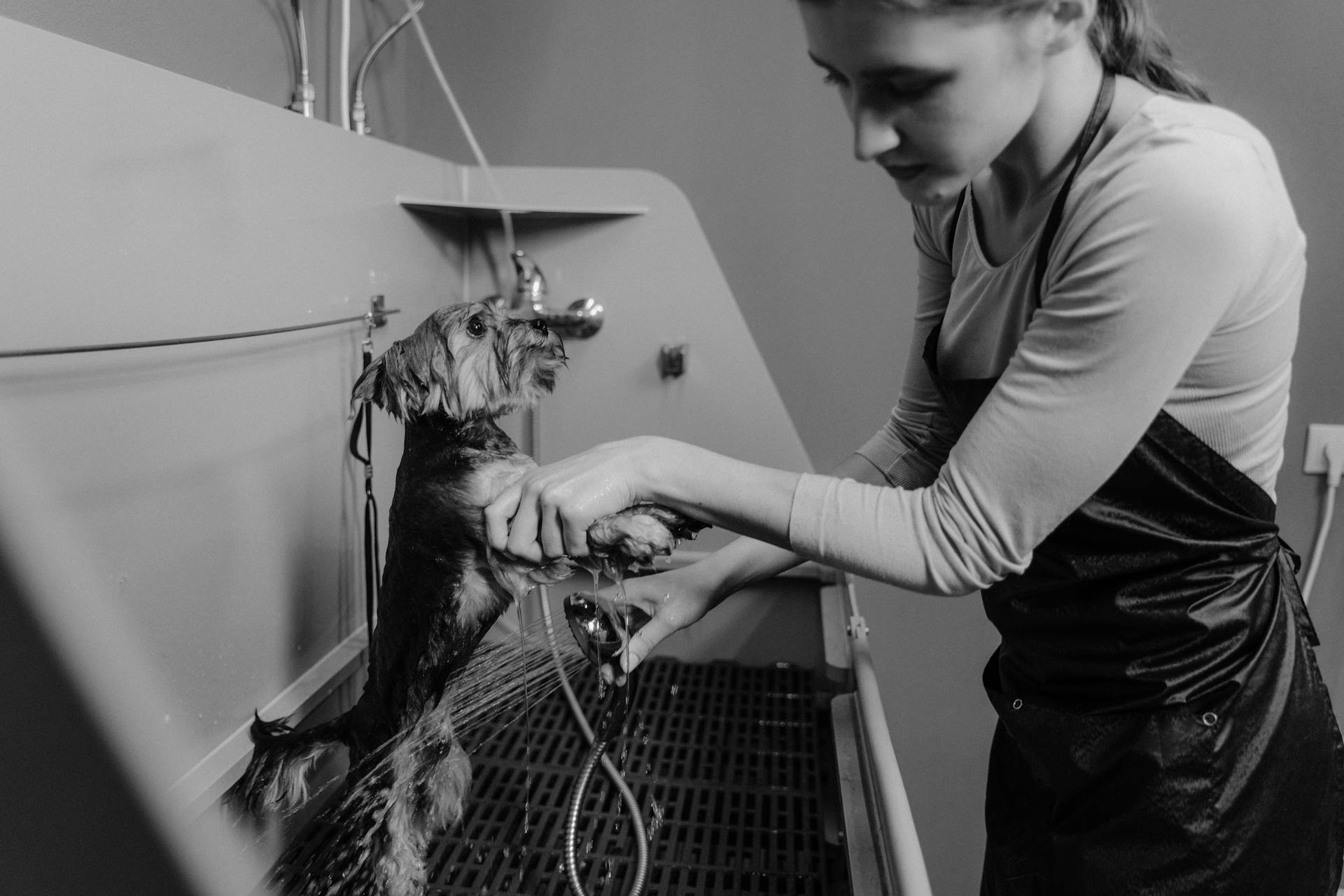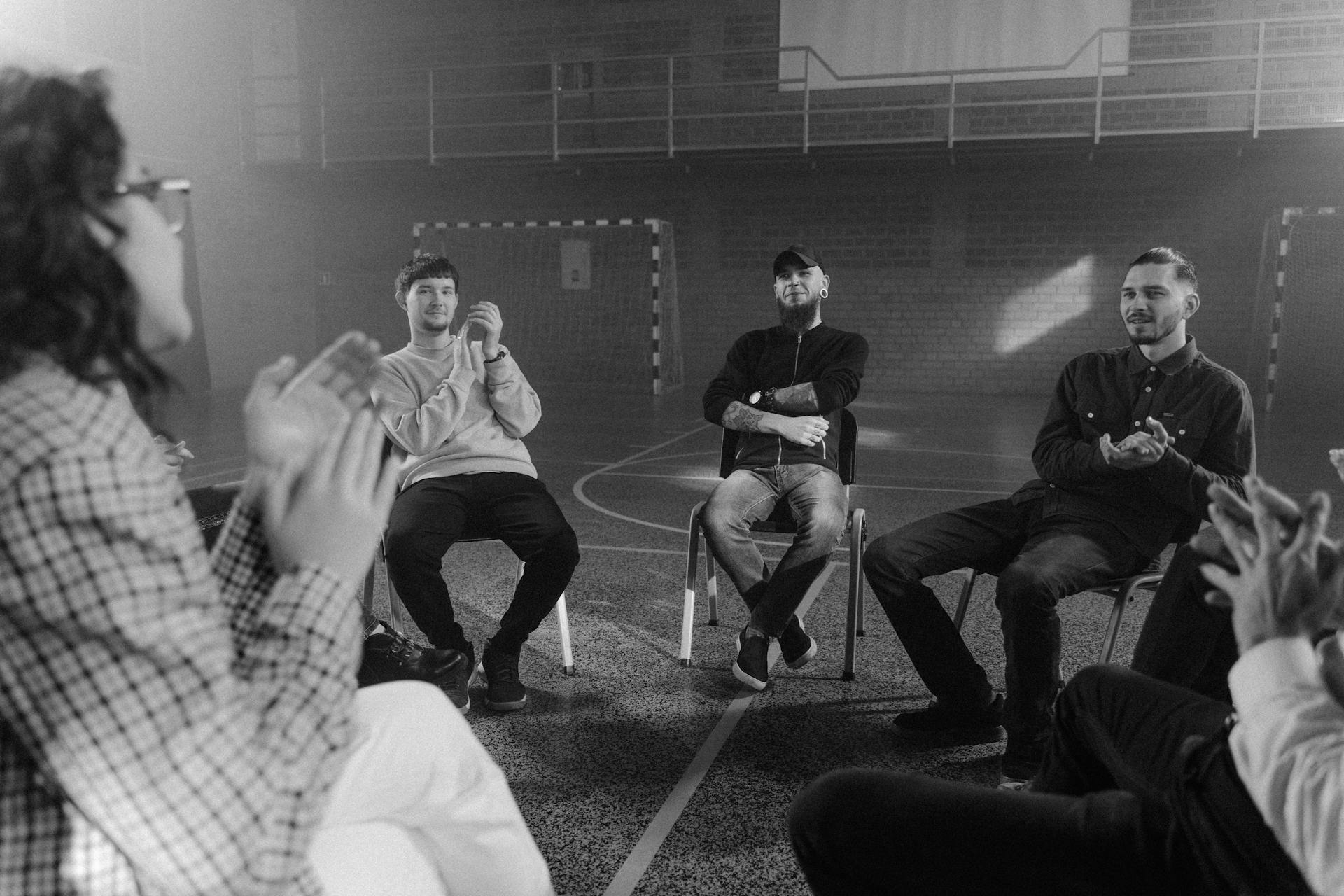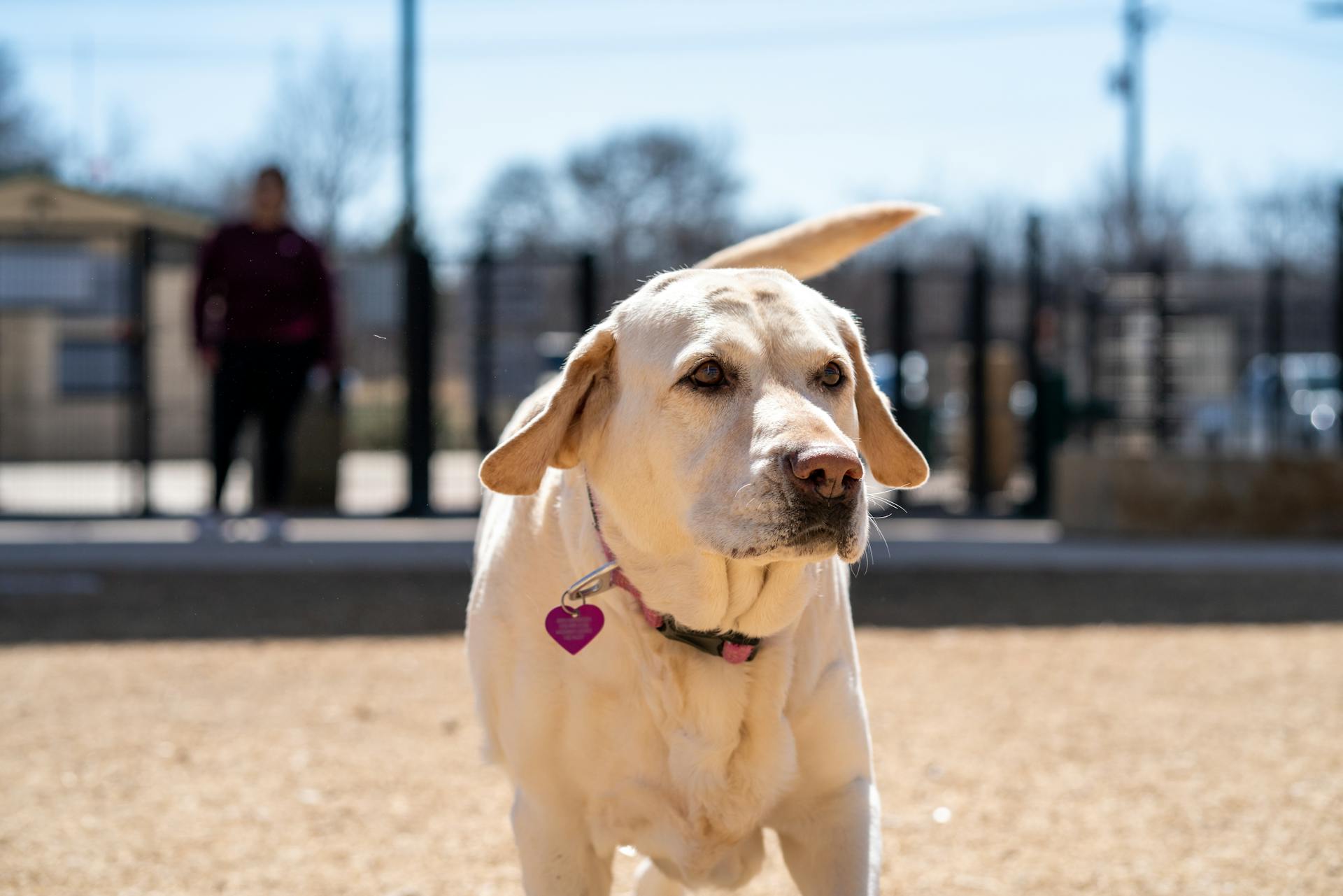
Dogs eating other animals' feces, also known as coprophagia, is a common behavior in canines.
This behavior can be caused by dietary deficiencies, such as a lack of certain nutrients, or by gastrointestinal issues.
Dogs may also eat feces due to boredom, anxiety, or stress.
Some breeds, like Labradors and Golden Retrievers, are more prone to coprophagia than others.
Dogs may be attracted to the smell and taste of feces, which can be similar to their mother's milk.
Discover more: Why Do Dogs Roll in Other Animals Feces
What is Coprophagia?
Coprophagia is a common behaviour in dogs where they eat their own poop, either their own or that of another animal.
Dogs often start this behaviour as puppies and can grow out of it as they get older, but some dogs will continue to eat their own poop or even other animals' droppings.
It's essential to rule out medical causes before a behavioural diagnosis is made, as coprophagia can sometimes be caused by a number of medical problems.
Dogs will happily tuck into horse manure, cow dung, rabbit droppings, or other similar offerings if given the chance.
Related reading: Dogs Eating Their Own Vomit
Why Do Dogs Eat Feces?
Dogs eat feces as scavenging behaviour, which is a natural instinct for them. They're attracted to the smell, texture, and taste of feces, which can be appealing to them even if we consider it unsanitary.
Dogs interpret smells differently than humans, and to them, feces isn't necessarily an unpleasant smell. In fact, they're consistently attracted to the odour of feces when exploring their environment.
As scavengers, dogs have evolved to make use of leftover nutrients in feces without getting ill, and they've adjusted to eating feces without any issues in most cases.
Managing Coprophagia
Managing coprophagia requires a multi-faceted approach. Consult with a vet to rule out any underlying medical problems or behavioral concerns.
If your dog is exhibiting coprophagia, it's essential to identify and address the cause of the behavior. This can be done with the help of a veterinarian, who can provide expert advice and support.
Some home remedies can be tried to stop your dog from eating their own poop, but these methods may not be suitable for young, old, or dogs with gastro-intestinal problems, so consult a vet first.
Learned Behavior
Dogs may learn to eat poop by observing their mum clearing up after them. This behavior can be passed down through generations, making it a deeply ingrained habit.
Dogs may also copy a ringleader and begin to eat poop due to this learned behavior. This is especially common in multi-dog households where one dog takes on a leadership role.
If you have a dog that's prone to eating poop, it's essential to address the behavior early on to prevent it from becoming a long-term habit.
Consider reading: Dog Eating Frozen Dog Poop
Preventative Steps
You can try some home-remedies to stop your dog from eating their own poop, but be cautious if your dog is young, very old, or has a history of gastro-intestinal problems. It's always best to consult a vet first.
Some home-remedies include trying preventative steps one at a time to work out which ones are successful. However, these methods might not be suitable for all dogs.
Processed kibble can cause severe digestive disturbances, which can result in coprophagia. This is because kibble is not a natural food source for dogs.
If you have concerns over your dog's coprophagia, it's best to chat with the vets at Vetwest for expert advice and support. They can help you identify and treat the cause of the behaviour for long-term success.
Dogs and Feces
Dogs might eat their own feces or feces from other animals due to a variety of issues.
Medical problems can cause a decrease in nutrient absorption, gastrointestinal upset, or an increased appeal of a dog's stool, leading to coprophagia.
Some possible medical causes include underfeeding or eating a poorly digestible diet, digestive enzyme deficiencies, parasites, vitamin and mineral deficiencies, and certain medications containing steroids.
Parasite testing and stool or blood tests may be necessary to identify any medical causes.
Dogs of all ages may exhibit coprophagia behavior, but it's more common in puppies that generally outgrow it by adulthood.
Curiosity and playfulness can lead to initial poo-eating behavior that attracts attention from owners, resulting in continued behavior.
Incorrect training techniques, such as sticking a dog's nose in their stool when they've soiled inside the home, can encourage coprophagia.
Here are some possible medical causes of coprophagia:
- Underfeeding or eating a poorly digestible diet
- Digestive enzyme deficiencies
- Parasites
- Vitamin and mineral deficiencies and malnutrition
- Diabetes, Cushing’s disease or thyroid disease
- Some medications containing steroids
A complete physical examination, diet evaluation, and testing of stool frequency and consistency can help identify any underlying medical causes.
Care and Hygiene
It's essential to understand that dogs are naturally curious and may eat other animals' feces due to their instinct to scavenge for food.
Dogs may also eat feces because they lack the instinct to avoid eating things that are not food, a trait called "coprophagia."
In multi-dog households, feces eating can be a significant issue, as it can spread diseases like parvovirus and giardiasis.
Regular cleaning and disinfecting of areas where dogs may encounter feces can help reduce the risk of disease transmission.
Dogs may also eat feces if they are not getting enough fiber in their diet, leading to malabsorption of nutrients.
A balanced diet that includes plenty of fruits and vegetables can help ensure your dog is getting enough fiber.
Additional reading: How to Stop Dog from Eating Other Dogs Food
When to Contact a Vet/Behaviourist
If your dog has started eating poo, it's a good idea to have a vet check-up to look for any medical causes before starting any training.
If your dog is showing signs of stress or anxiety, you may want to seek training advice from a certified dog behaviourist.
Call your vet for advice if your dog's sudden interest in eating poo doesn't seem right, and they're not acting like themselves.
Once your dog has the all clear from your vet, it's best to seek training advice from a certified dog behaviourist to address any underlying issues.
Frequently Asked Questions
Is dogs eating poop a dominance thing?
Dogs eating poop can be linked to dominance/submission pack behavior, but it's often a learned behavior to avoid punishment rather than a true sign of dominance
Sources
- https://www.vetwest.com.au/pet-library/why-do-dogs-eat-their-own-poo/
- https://www.pdsa.org.uk/pet-help-and-advice/pet-health-hub/conditions/coprophagia-in-dogs-dogs-eating-poo
- https://www.purina.co.uk/articles/dogs/health/digestion/dog-eating-faeces-coprophagia
- https://peterdobias.com/blogs/blog/why-do-dogs-eat-poop
- https://www.doglistener.co.uk/dogs_eating-poop-poo-coprophagia-shtml
Featured Images: pexels.com


